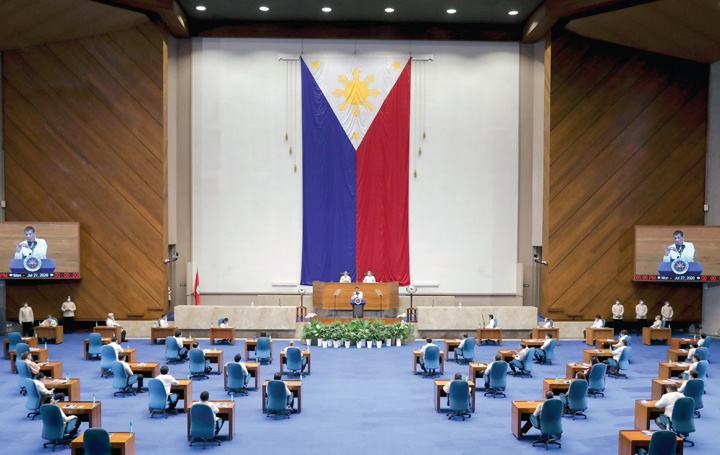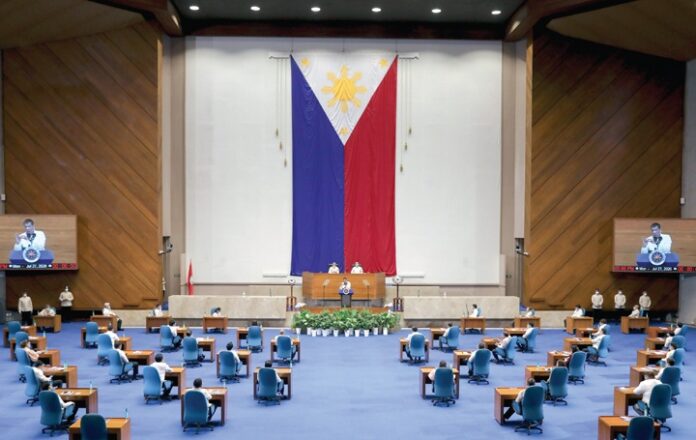
CITING its “constituent powers,” the House of Representatives on Monday kicked off plenary deliberations on proposals to amend the restrictive economic provisions of the Constitution.
In sponsoring the Resolution of Both Houses Number 2 (RBH 2), Committee on Constitutional Amendments Chairman Alfredo Garbin Jr., House Committee on Ways and Means Chairman Joey Sarte Salceda and Marikina Rep. Stella Luz Quimbo cited the urgency to amend the 1987 Constitution to attract foreign direct investments, which badly needed to rebuild Philippine economy shattered by the Covid-19 pandemic.
“With your indulgence, allow me to share estimates from the Department of Finance, which shows that by 2030, if we achieve FDI levels similar to even the most conservative case, namely that of Myanmar, our GDP performance will be 7.9 percentage points higher than where it would be if we make no changes to the investment regime,” he said.
“Investments would be a staggering 10.3 percentage points better than baseline by 2030. Real wages would improve by 5 percentage points more during the same period,” he added.
Salceda said his estimates show that the country stands to gain a total of 6.6 million jobs, if Congress immediately follows RBH 2 with the right enabling laws.
Citing the Organisation for Economic Co-operation and Development or OECD, Salceda said foreign ownership restrictions in the law represent the number one barrier to foreign investment.
Salceda said as Vietnam loosened its FDI restriction, it overtook the Philippines in FDI inflow.
“Vietnam used to have tighter FDI restrictions, owing to its war-torn past and its previous conflict with Western capitalist counrties. While the Philippines restricted with the 1087 Constitution, Vietnam was undergoing economic transformation with the ‘DoiMoi’ reforms,” he said.
“During a critical period before the 1997 Asian Financial Crisis, our economy remained closed while our neighbors began opening up. In fact, we remain among the most restrictive economy in the world to FDIs. We are the most restrictive economy in our own region,” he added.
Salceda said the Philippines has locked itself out of significant foreign investments and the jobs they create.
“We have spend hundreds of billions of pesos in foregone revenue for tax incentives, when we have not tried a simpler, cheaper solution: opening industries in need of capital to foreign investment through legislative action. Instead of sending our labor force abroad, let us attract foreign investment and create the jobs here in the Philippines,” Salceda added.
“I am under no illusion that RBH 2 is a magic wand for all of our problems. But it is a necessary beginning. The overwhelming evidence is that we made a mistake to hardcode our fears and paranoia into our Constitution. While we remained stubborn, our neighbors began to leapfrog us,” he said.
Moreover, Garbin said amending the Charter is important in order to give government the freedom to adopt measures that will pave the way for economic development.
“It is wise for Congress to amend the Constitution by adding the phrase ‘unless otherwise provided by law’ in order to give the government enough flexibility to consider different circumstances prevailing at different stages our road to economic development before formulating policies that should be time bound,” he said.
Garbin emphasized that economic conditions “are never static, so must the fundamental law be freed from the constraint of rigidity. While it is reduced to writing, it should not be devoid of the element of flexibility.”
According to Garbin, observers have pointed out that the Constitution’s restrictive economic provisions “have proven to be a bane, rather than a boon for the country, for they have restricted or discouraged the flow of foreign direct investments.”
“While these provisions may be very well-meaning and appear to favor the interests of Filipinos, over the long haul, the country and the common good of all Filipinos suffer,” added Garbin.
These experts, he said, “believe in the need to amend the Constitution to eliminate these overly protective provisions to attract more foreign investments and to adopt policies to enable the country to compete more effectively in the global economy.”
The legislator was referring to provisions of the Constitution that limit foreign ownership in business enterprises operating in the country, including public utilities.
While Salceda reminded the chamber that all Filipinos are duty-bound to respect and obey the Constitution, “the obligation to respect, obey and to dutifully protect does not equate to permanence.”
Garbin had earlier revealed that the House plans to approve the resolution on third and final reading before Congress goes on recess on March 27.
Urgent
For her part, Quimbo said the need for foreign direct investments became even more urgent as a result of the pandemic.
“As cases began to climb, we imposed restrictions through varying degrees of community quarantine; businesses closed, employees were retrenched; one year later, on January 28, the PSA announced that our economy contracted by 9.5 percent, the steepest economic downturn in our postwar history, and the worst performance in the Asean thus far,” she said.
“Having sustained such severe losses, we can’t afford to lose any more time. We must realize that in order to return to our prior trajectory of growth, we need to put ourselves in a better position to compete for foreign investments, which we are already losing to our neighbors. If we don’t address this, many more Filipinos will have to leave their families and look for jobs abroad,” she added.
Quimbo said this economic Cha-cha is one necessary step toward the creation of a fairer and more dynamic business environment, one geared towards maximizing benefits for the Filipino people.
“There is no sufficient reason for why the Philippine Constitution must be decidedly against the liberalization of our economy, especially at times when protectionist policies are antithetical to our economic interests,” the lawmaker said.
“Based on my own review of existing literature, 122 out of 167 journal articles provide evidence to support that a more liberal policy can increase our capital, firm productivity, government revenues, GDP growth, and employment. All these are important pathways to reducing income inequality and poverty,” Quimbo said.
Quimbo said the purpose of this move is not to simply open the flood gates and allow foreign companies to crowd out the local businesses.
“It is not a free pass. By including the phrase ‘unless otherwise provided by law,’ the measure provides flexibility to these economic provisions, but still allows the legislature to address the fear of some of our countrymen that we will be inundated with foreign businesses, to the detriment of local industry,” she added.

